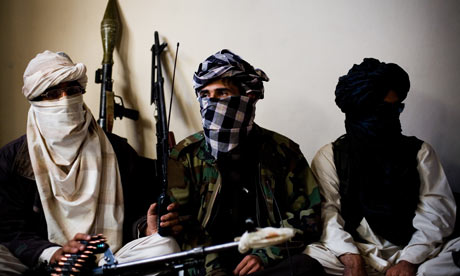
Qomendan Hemmet, the Taliban commander in Salar district, between his two lieutenants in Wardak, Afghanistan. Photograph: Ghaith Abdul Ahad
DEBKAfile Exclusive Analysis June 18, 2011, 5:59 PM (GMT+02:00)
Afghan President Hamid Karzai, America and NATO's key ally in the war on the Taliban and al Qaeda, turned furiously on the United States in a public outburst Saturday, June 18. He accused Washington of carrying on talks with the Taliban behind Kabul's backs and contaminating the Afghan environment with chemical pollutants used in NATO war operations.
 Karzai becomes the third head of a Muslim country, after Saudi Arabia and Pakistan, to take strong exception to US foreign policy and distance himself from the Obama administration.
Karzai becomes the third head of a Muslim country, after Saudi Arabia and Pakistan, to take strong exception to US foreign policy and distance himself from the Obama administration.Addressing an international conference of young Afghans Saturday, June 18, Karzai said: "You remember a few years ago I was saying thank you to the foreigners for their help, every minute we were thanking them. Now I have stopped saying that, except when Spanta forced me to say thank you." (He was referring to Rangiin Spanti his national security adviser.)
As to the Americans, Karzai charged bitterly, "They're here for their own purposes, for their own goals and they're using our soil for that. Every time when their planes fly it makes smoke, when they drop bombs they have chemical materials in them, our people get killed but our environment is damaged… our animals, our people… They should not think we are uneducated and do not know anything."
DEBKAfile's sources report that the Afghan president's diatribe was prompted by two developments.
1. He suspects that the United States is secretly bypassing US-Afghan-Pakistan talks with the Taliban which have been ongoing quietly for some months and opened up a direct channel to the Taliban irrespective of the interests of Kabul and Islamabad.
1. He suspects that the United States is secretly bypassing US-Afghan-Pakistan talks with the Taliban which have been ongoing quietly for some months and opened up a direct channel to the Taliban irrespective of the interests of Kabul and Islamabad.
Karzai brought his suspicions out in the open by saying: "Peace talks are going on with the Taliban. The foreign military and especially the United States itself is going ahead with these negotiations." At the same time, he said: "The peace negotiations between the Afghan government and Taliban movement are not yet based on a certain agenda or physical [meetings]. Contacts have been established."
The implication in his words was that the Americans have already given substantially more ground to the Taliban than Kabul was willing to venture. For instance, Friday, June 17, the UN Security Council unanimously agreed to rephrase previous resolutions defining al Qaeda and Taliban as terrorist organizations subject to sanctions by omitting reference to the Taliban.
DEBKAfile reports the conviction in Kabul and Islamabad that, less than two months after the death of Osama bin Laden, the Americans are in a hurry to draw their troops out of Afghanistan - even at the price of weakening Afghan and Pakistan bargaining positions against the insurgents.
DEBKAfile reports the conviction in Kabul and Islamabad that, less than two months after the death of Osama bin Laden, the Americans are in a hurry to draw their troops out of Afghanistan - even at the price of weakening Afghan and Pakistan bargaining positions against the insurgents.
2. Both have found a sympathetic ear for their gripes against the Obama administration in Riyadh. Afghanistan and Pakistan have begun reorienting their polices on a relationship with Saudi Arabia which has set up with the Gulf emirates a new grouping to launch a separate external and security policy in opposition to Washington's approach to the Muslim nations and the revolts against Arab rulers.
Only a week ago, at the height of the Islamabad-Washington crisis which flared in the wake of the US raid that killed Osama bin Laden, Karzai visited Islamabad for two days (June 10-11) of long private talks with Pakistan's leaders.
Some informed sources say the Afghan president also saw senior Saudi officials there on the quiet.
DEBKAfile notes that the Saudis made offers to match suspended US assistance dollar for dollar to Egyptian President Hosni Mubarak when he was still fighting the US push to evict him, then to the military junta ruling in his stead and more recently to the Pakistan government.
